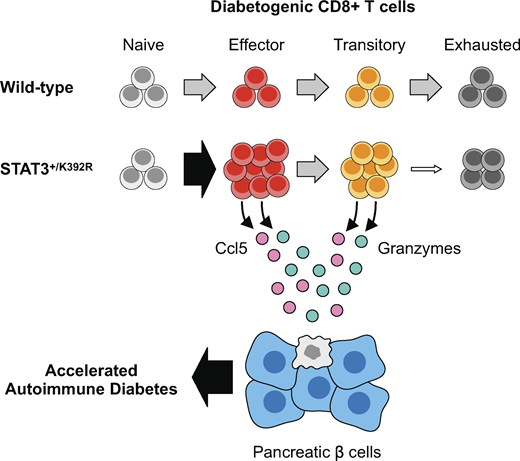
Warshauer JT, Belk JA, Chan AY, Wang J, Gupta AR, Shi Q, Skartsis N, Peng Y, Phipps JD, Acenas D, Smith JA, Tamaki SJ, Tang Q, Gardner JM, Satpathy AT, Anderson MS.
J Exp Med, 11 June 2021
Naturally occurring cases of monogenic type 1 diabetes (T1D) help establish direct mechanisms driving this complex autoimmune disease. A recently identified de novo germline gain-of-function (GOF) mutation in the transcriptional regulator STAT3 was found to cause neonatal T1D. We engineered a novel knock-in mouse incorporating this highly diabetogenic human STAT3 mutation (K392R) and found that these mice recapitulated the human autoimmune diabetes phenotype. Paired single-cell TCR and RNA sequencing revealed that STAT3-GOF drives proliferation and clonal expansion of effector CD8+ cells that resist terminal exhaustion. Single-cell ATAC-seq showed that these effector T cells are epigenetically distinct and have differential chromatin architecture induced by STAT3-GOF. Analysis of islet TCR clonotypes revealed a CD8+ cell reacting against known antigen IGRP, and STAT3-GOF in an IGRP-reactive TCR transgenic model demonstrated that STAT3-GOF intrinsic to CD8+ cells is sufficient to accelerate diabetes onset. Altogether, these findings reveal a diabetogenic CD8+ T cell response that is restrained in the presence of normal STAT3 activity and drives diabetes pathogenesis.